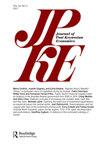西班牙私人债务与公共盈余之间的联系
IF 1
3区 经济学
Q4 ECONOMICS
引用次数: 0
摘要
纵观近代史,西班牙经济仅在2005年至2007年间出现财政盈余。分析人士一致认为,这种盈余是经济超常增长的产物,但他们往往没有注意到,这是基于私人债务的同样超常增长,而私人债务增长是实现财政盈余的必要条件。这一发现可以从部门平衡的优势中得到阐释:在西班牙等通常存在经常账户赤字的经济体中,只有在出现信贷泡沫的情况下,才能实现公共盈余。为了验证这一观点,我们研究了西班牙房地产和信贷泡沫对公共账户的影响,我们还估计了自回归向量的计量经济模型。研究结果证实了一个可行的假设:西班牙近年来唯一的财政盈余,要归功于该国历史上规模最大的私人债务进程。这一证据可能对经济政策产生重要影响,因为西班牙等经常出现经常账户赤字的经济体可能难以在不经历信贷繁荣的情况下实现其财政目标。本文章由计算机程序翻译,如有差异,请以英文原文为准。
Link between private debt and public surplus in Spain
Abstract Throughout recent history, the Spanish economy registered a fiscal surplus only between 2005 and 2007. Analysts agree that this surplus was a product of the extraordinary economic growth, but they often fail to notice that it was based on similarly exceptional growth in private debt, which was a necessary condition for achieving fiscal surplus. This finding can be illuminated from the vantage of sectoral balances: in economies that usually run a current account deficit, such as Spain’s, a public surplus can be achieved only in situations characterized by a credit bubble. To verify this idea we examine the impact that the Spanish real estate and credit bubble had on public accounts, and we also estimate an econometric model of autoregressive vectors. The results corroborate the working hypothesis: Spain’s only fiscal surplus in recent years was achieved thanks to the largest private indebtedness process in the country’s history. This evidence could have important implications in terms of economic policy, because economies with regular current account deficits such as Spain could have difficulties in achieving their fiscal goals without experiencing credit booms.
求助全文
通过发布文献求助,成功后即可免费获取论文全文。
去求助
来源期刊

Journal of Post Keynesian Economics
ECONOMICS-
CiteScore
1.70
自引率
10.00%
发文量
23
期刊介绍:
The Journal of Post Keynesian Economics is a scholarly journal of innovative theoretical and empirical work that sheds fresh light on contemporary economic problems. It is committed to the principle that cumulative development of economic theory is only possible when the theory is continuously subjected to scrutiny in terms of its ability both to explain the real world and to provide a reliable guide to public policy.
 求助内容:
求助内容: 应助结果提醒方式:
应助结果提醒方式:


